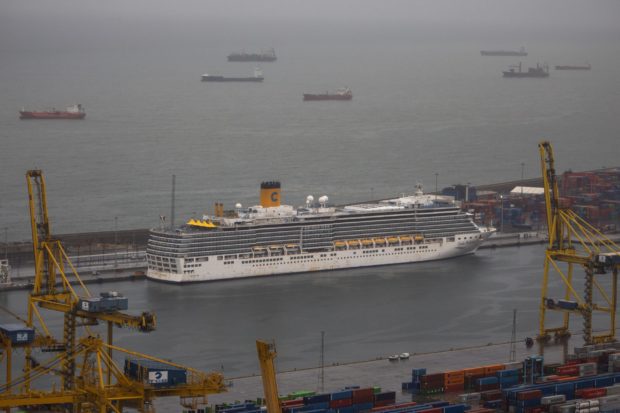
A view of Costa Deliziosa cruise ship moored at the port of Barcelona on Monday, April 20, 2020. Several cruise ships have become coronavirus traps after outbreaks were discovered on board. On Monday the Deliziosa made its first port-of-call in 35 days after docking in Barcelona, Spain. (AP Photo/Emilio Morenatti)
BARCELONA, Spain — For Spanish traveler Carlos Payá, being on an around-the-globe luxury cruise while the rest of world scurried into their homes for fear of the COVID-19 pandemic was beyond surreal. It was “a stroke of good luck.”
Now, his trip inside the virus-free bubble that the Costa Deliziosa cruise ship became on its 15-week odyssey is coming to an end. The boat steamed toward Barcelona, Spain, where it made its first port of call on Monday after 35 days of continuous sailing with no human contact with the outside world.
“It was not surreal. It was incredible,” Payá told The Associated Press (AP) by text messages on Saturday evening. ¨We have family in our home countries. The news that was arriving from home was causing us all a lot of worry and grief. For us, it was a stroke of good luck to be where we were.”
The 58-year-old Payá, a sports writer traveling with his wife, said when news started to reach the boat of the rapid spread of the coronavirus in their native Spain, their first desire was to get home to their two grown children in their hometown of Valencia.
But with ports denying the boat entry, they had to temper their concern with the amenities on board.
Unlike other cruise ships that suffered outbreaks and were often put in quarantine to protect port cities, the Deliziosa has found no cases of the COVID-19 virus, according to its owner, Italian cruise company Costa Crociere. So the boat’s 1,831 passengers were free to use the ship’s facilities and entertainments.
Payá said the ship, which set sail from Venice in early January, stopped making ports of call after leaving western Australia last month. Overall, he praised the ship’s captain and crew for their care.
‘70 wonderful days’
He said that the passengers’ last chance to touch land was in Perth, where they docked after “70 wonderful days” of crossing the Atlantic and Pacific oceans. That was when the World Health Organization alerted the pandemic in March.
From that point the ship made only technical and refueling stops, before the journey back toward the Mediterranean.
“Of course, for those of us who have children in Spain, we would have preferred to return,” Payá said. “Other passengers, on the other hand, given their old age, wanted to stay on board, knowing that the boat was safe and secure.”
A company spokesperson said a passenger left the ship earlier in the week in Marsala, Sicily, for health issues and had a COVID-19 test, which was negative. Costa said the passengers were confined to their cabins only for the period until the ship heard back that the ill guest who got off in Sicily had tested negative.
The Deliziosa, a nearly 300-meter (1,000-foot) vessel will head to its final destination, Genoa, Italy, where it is expected to let off the remaining passengers.
“The health situation on board the ships, with 1,814 guests and 898 members of the crew, doesn’t present any problem for public health and no case of COVID-19,” Costa’s statement said.
“The return home will mean a radical change, a brutal one,” Payá said on Sunday after packing his bags before spending his last night on the Deliziosa. “Fear is what made many passengers want to stay on board. But it is something that we must face, just as our families, friends, and neighbors already have.”